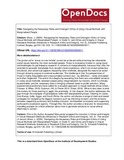Navigating the Necessary Risks and Emergent Ethics of using Visual Methods with Marginalised People
Abstract
The global call to ‘leave-no-one behind’ cannot be achieved without tacking the intractable social issues faced by the most excluded people. There is increasing interest in using visual methodologies for participatory research in contexts of marginalisation, because they offer the potential to generate knowledge from people’s lived experience, which can reveal subjective, emotional, and contextual aspects missed by other methods; alongside the means for action through showing outputs to external audiences. The challenge is that the perspectives of those in highly inequitable and unaccountable contexts are – by definition – rarely articulated and often neglected. The author thus begins by assuming that there are unavoidable tensions in using visual methods; between perpetuating marginalisation by inaction, which is ethically questionable; and the necessary risks in bringing unheard views to public attention. Many experienced practitioners have called for a situated approach to visual methods ethics (Clark, Prosser, & Wiles, 2010; Gubrium, Hill, & Flicker 2014; Shaw, 2016). What is less clear is what this means for those wanting to apply this practically. In this chapter, the author addresses this gap through the exemplar of participatory video with marginalised groups. Drawing on cases from Kenya, India, Egypt, and South Africa, the author contributes a range of tried-and-tested strategies for navigating the biggest concerns such as informing consent; and the tensions between respecting autonomy and building inclusion, and between anonymity and supporting participant’s expressive agency. Through this, the author provides a resource for researchers, including prompts for critical reflection about how to generate solutions to visual ethical dilemmas in context.
Citation
Shaw, J. (2020), 'Navigating the Necessary Risks and Emergent Ethics of Using Visual Methods with Marginalised People', in Dodd, S. (ed) Ethics and Integrity in Visual Research Methods (Advances in Research Ethics and Integrity, Vol. 5), Emerald Publishing Limited, Bingley, pp105-130, DOI: 10.1108/S2398-601820200000005011DOI
10.1108/S2398-601820200000005011Rights holder
Copyright © 2020 Emerald Publishing LimitedCollections
- IDS Research [1671]

